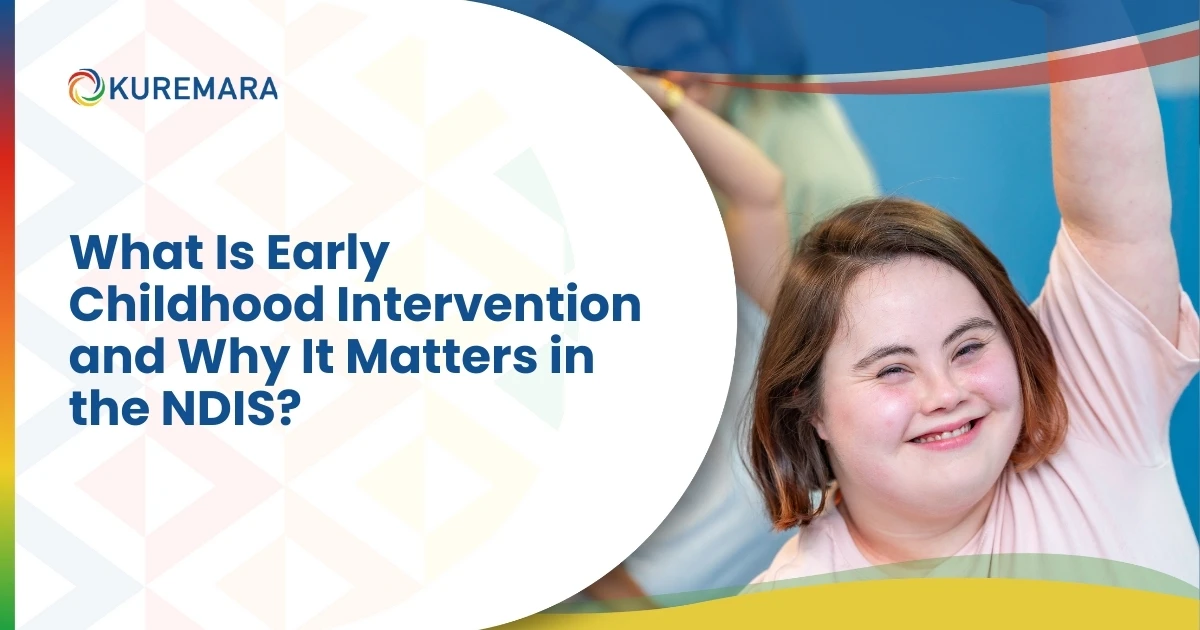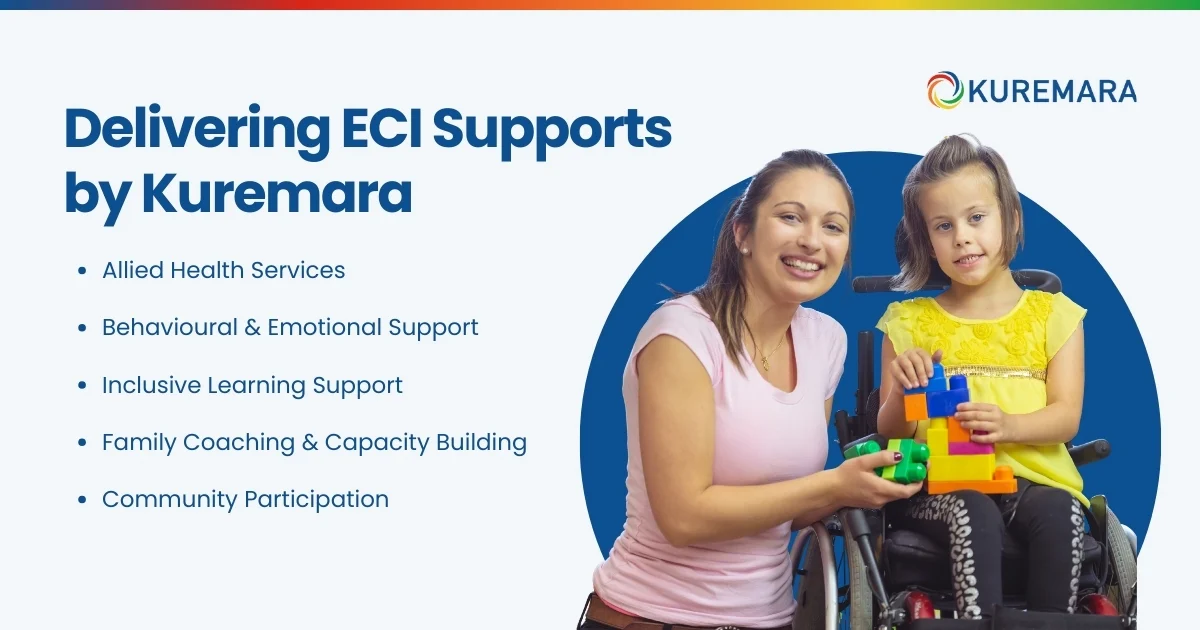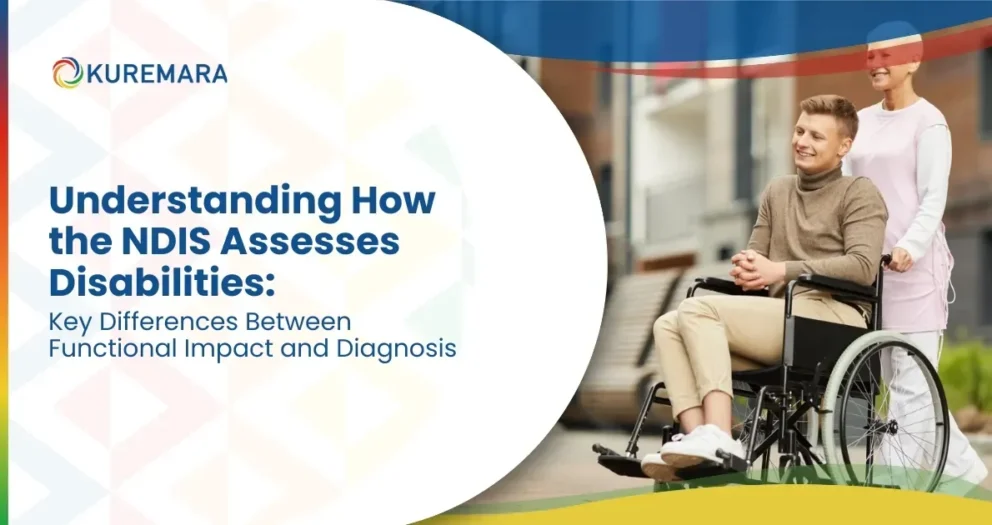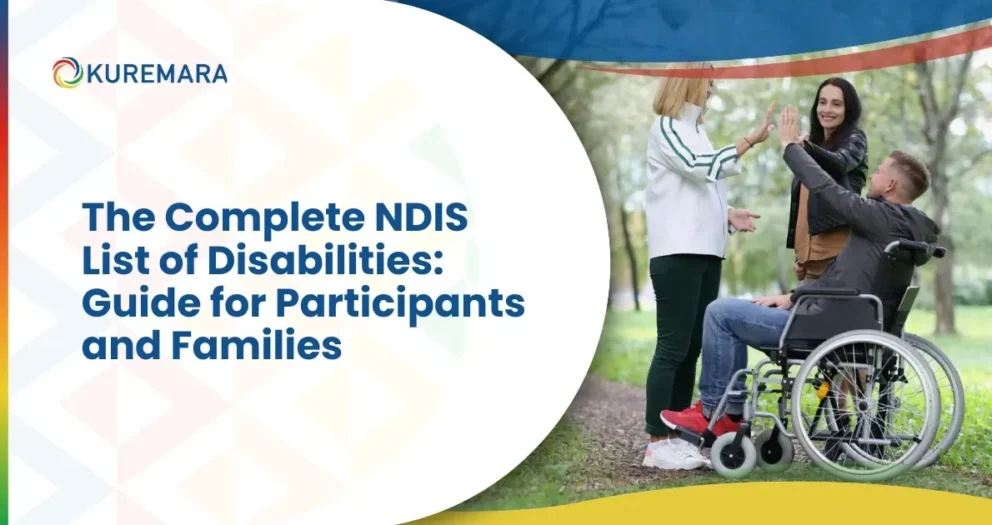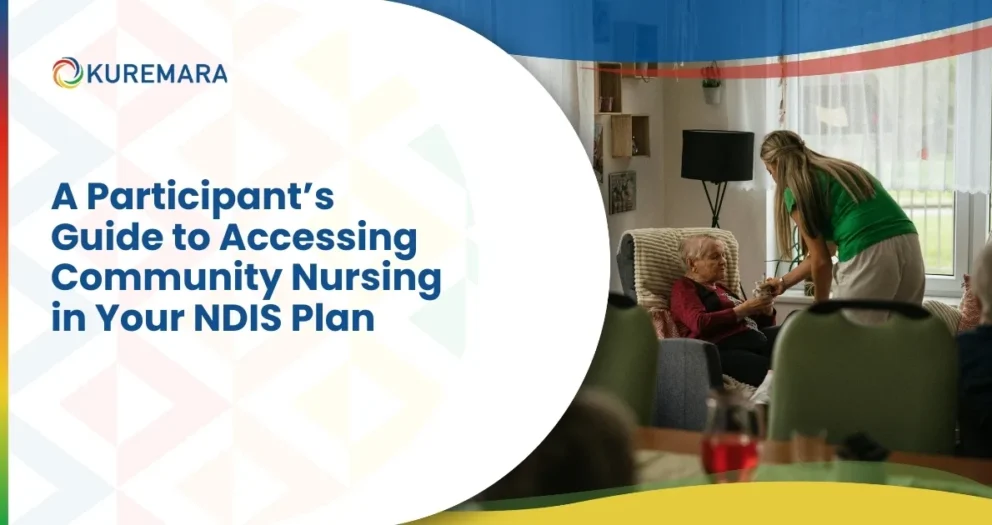Introduction: Laying the Foundation for a Brighter Future
The early years of a child’s life, particularly from birth to six years old, are a time of incredible growth and change. During this period, the brain develops faster than at any other time, laying the groundwork for lifelong learning, behaviour, and health. These formative years are when children begin to develop language, motor skills, emotional regulation, and social behaviours that will shape their future.
Because of this rapid development, it’s also the window where early support can have the greatest impact. When developmental delays or disabilities are identified early, timely intervention can help children catch up or manage challenges more effectively.
Introducing Early Childhood Intervention (ECI)
Early Childhood Intervention (ECI) is a holistic approach to supporting children who show signs of developmental delay or have diagnosed disabilities. Its purpose is to help children build essential skills, engage in daily life, and grow with confidence. But it’s not only about the child, it’s about empowering families and caregivers with the knowledge, tools, and confidence to support their child’s journey.
In Australia, the National Disability Insurance Scheme (NDIS) plays a central role in funding and delivering supports to people with disability. For children under seven, the NDIS offers tailored support through what is known as the NDIS early childhood early intervention approach. This ensures families receive the right support at the right time, when it matters most.
This blog will guide you through the essentials of early intervention NDIS programs, explore the NDIS Early Childhood Approach, explain the benefits for both child and family, outline how you can access these supports, and describe how Kuremara can support your journey through tailored services.
Demystifying Early Childhood Intervention (ECI)
* What Exactly is ECI?
Early childhood intervention NDIS services are a range of tailored supports offered to children aged 0-9 years who have a developmental delay or disability. The aim is to enhance their development, promote participation in everyday life, and help them reach their full potential.
But ECI isn’t only focused on the child, it’s about building the capacity of families too. Families are at the heart of a child’s development, and ECI recognises this by providing tools, coaching, and emotional support for caregivers.
* Who Benefits from ECI?
Children who may benefit from ECI include:
-
-
- Those with diagnosed disabilities such as Autism Spectrum Disorder, Down Syndrome, or Cerebral Palsy.
-
-
-
- Children with significant developmental delays in communication, motor skills, social engagement, or learning.
-
-
-
- Families who have concerns about their child’s development and are seeking guidance.
-
Types of ECI Support
Supports provided through NDIS early childhood intervention are diverse and adapted to each child’s unique needs. Common services include:
- Speech therapy – To assist with communication challenges
- Occupational therapy – To develop motor and self-care skills
- Physiotherapy – To improve movement and physical development
- Early childhood education – To support learning in age-appropriate ways
- Psychology and behavioural support – To foster emotional and behavioural wellbeing
- Family support and coaching – To guide caregivers on how to support their child at home and in the community
The NDIS Early Childhood Approach: A Tailored Framework
Shifting the Paradigm: The Early Childhood Approach (ECA)
The NDIS delivers early childhood support through a framework previously known as Early Childhood Early Intervention (ECEI), now called the Early Childhood Approach. This refined method recognises that young children and their families need timely, personalised, and coordinated support, not a one-size-fits-all model.
The Early Childhood Approach prioritises flexibility and is designed to be both family-friendly and responsive to a child’s changing needs.
Key Principles of the NDIS ECA
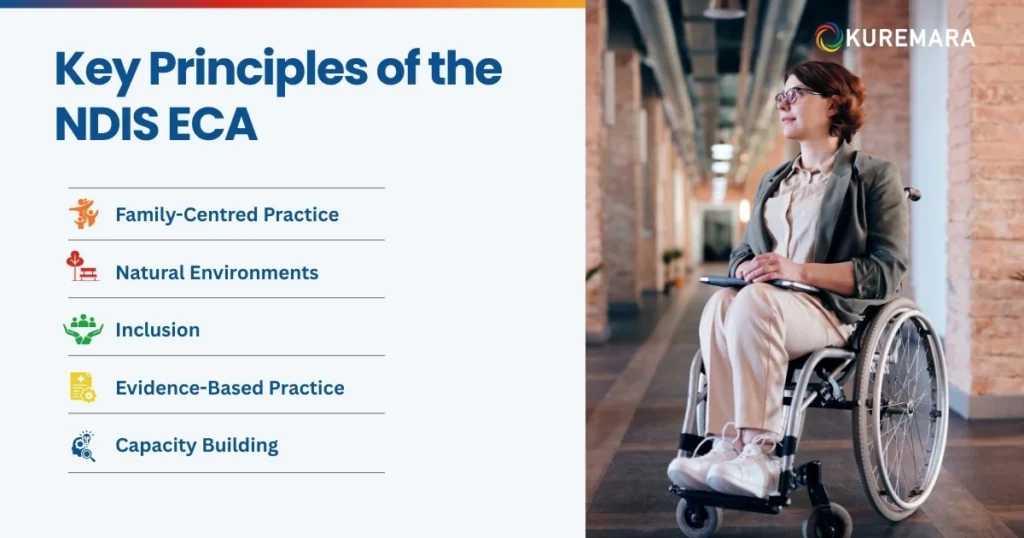
- Family-Centred Practice: Families know their child best. ECI works in partnership with caregivers to strengthen their confidence and capabilities.
- Natural Environments: Interventions are most effective when they happen in places where the child feels comfortable, like home, child care centres, or local parks.
- Inclusion: Every child has a right to participate in everyday activities with peers.
- Evidence-Based Practice: All supports are grounded in research and clinical best practice.
- Capacity Building: The aim is to equip families and children with the skills to succeed independently over time.
The Role of the Early Childhood Partner (ECP)
A critical part of the NDIS Early Childhood Approach is the Early Childhood Partner. ECPs are professionals who are the first point of contact for families with concerns about a child’s development.
Their responsibilities include:
- Listening to family concerns and understanding the child’s needs
- Providing short-term, targeted interventions
- Helping families connect to local mainstream services
- Assisting with NDIS access where long-term support may be needed
Short-Term Support vs. NDIS Plan
It’s important to understand that not every child needs a full NDIS plan. Some children benefit greatly from short-term supports and don’t require longer-term funding. However, when ongoing, more intensive support is necessary, the ECP will assist the family in developing a formal NDIS plan.
Why Early Childhood Intervention Matters: Profound Benefits
1. For the Child: Unlocking Potential
-
- Improved Developmental Outcomes: ECI promotes stronger cognitive, emotional, physical, and communication skills
-
- Increased Participation: Children become more confident in daily activities like play, learning, and social interactions
-
- Reduced Future Needs: Early support may reduce the need for more complex interventions later in life
-
- Enhanced School Readiness: Prepares children with foundational skills to transition successfully to school environments
2. For the Family: Empowerment and Support
-
- Increased Confidence: Families learn how to support their child and feel more empowered in their parenting journey
-
- Reduced Isolation: Connecting with professionals and peer networks helps families feel less alone
-
- Improved Family Functioning: With the right supports, families adapt more positively to challenges
-
- Advocacy Skills: Parents become better equipped to represent their child’s needs in school, health, and community settings
3. Long-Term Societal Impact
-
- Greater Independence: Many children grow into adults who require less support and lead fulfilling lives
-
- Reduced Health & Welfare Burden: Early support helps lessen future reliance on public services
-
- Inclusive Communities: ECI fosters a culture that embraces diversity and inclusion from a young age
Accessing Early Childhood Intervention Through the NDIS
A. Initial Steps: Connecting with an Early Childhood Partner
Families can start by contacting an Early Childhood Partner in their local area. You can find ECPs through the NDIS website, community health centres, or early childhood networks.
The first meeting will typically involve discussing your concerns, observing the child’s behaviour and development, and setting shared goals for support.
B. The Assessment Process
The ECP may work alongside health professionals such as speech pathologists, occupational therapists, and educators to gather insights about the child. Relevant reports, health assessments, and school feedback are helpful in building a full picture of the child’s needs.
This collaborative assessment ensures that supports are tailored and appropriate, whether short-term or long-term.
C. Developing a Support Plan
Depending on the outcome of the assessment:
-
-
- The child may receive short-term early supports, such as therapy sessions or access to playgroups
-
-
-
- Or, they may be supported in applying for an NDIS plan which includes funded supports for longer-term goals
-
If approved, families can choose how the plan is managed:
-
-
- Self-managed – The family manages the budget
-
-
-
- Plan-managed – A plan manager handles budgeting and payments
-
-
-
- NDIA-managed – The NDIS handles all payments directly
-
D. Navigating the Journey
The journey can feel overwhelming at times, but families are not alone. Your Early Childhood Partner is there to walk alongside you, helping you understand your options, access the right supports, and adjust your child’s plan as needs evolve.
How Kuremara Supports Early Childhood Intervention: Our Role as a Trusted NDIS Provider
1. A Compassionate, Family-Focused Approach
At Kuremara, we believe early childhood intervention is a collaborative journey. As a registered NDIS provider, we work hand-in-hand with families to ensure that every child receives the right support in their most crucial years. Our services are not just clinically sound, they’re warm, inclusive, and tailored to the unique needs of your family.
2. Our Role in Delivering ECI
Kuremara delivers a wide range of NDIS early childhood intervention supports, including:
-
-
- Allied Health Services – Speech therapy, occupational therapy, and physiotherapy
-
-
-
- Behavioural & Emotional Support – Guided by trained professionals
-
-
-
- Inclusive Learning Support – For childcare, kindergarten, and community engagement
-
-
-
- Family Coaching & Capacity Building – Empowering parents and carers through ongoing support
-
-
-
- Community Participation – Helping families engage in playgroups, social activities, and networks
-
Our therapists meet families in their chosen environment, home, daycare, or community spaces, to make support practical and accessible.
3. A Trusted Partner in Your NDIS Journey
In addition to delivering services, Kuremara can assist you with:
-
-
- Implementing your NDIS plan
-
-
-
- Connecting with Early Childhood Partners and community supports
-
-
-
- Advocating for plan reviews and changes
-
-
-
- Understanding plan management options
-
4. Why Families Choose Kuremara
-
- Registered and experienced NDIS provider
-
- Person-centred, inclusive, and culturally sensitive care
-
- Specialists in early childhood development
-
- Flexible support delivery tailored to your needs
-
- Strong partnerships with Early Childhood Partners and professionals
Conclusion: Investing in Our Youngest Australians
NDIS early childhood early intervention is more than a policy; it’s a life-changing opportunity. By addressing needs early, we help children grow into confident learners and active participants in their communities.
If you’re a parent or carer with concerns about your child’s development, don’t wait. The earlier you act, the more support is available. Reach out to an Early Childhood Partner or connect with Kuremara to begin the journey.
Visit the NDIS website to find your local Early Childhood Partner today.
Or contact Kuremara to learn how we can support your child through early intervention.
Every child deserves the chance to thrive. With the right support, guidance, and early intervention, we can build a brighter, more inclusive future, together.
 care@kuremara.com.au
care@kuremara.com.au
